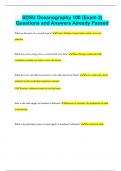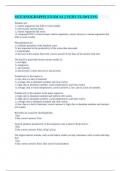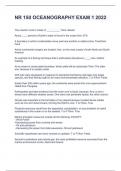Oceanography - Study guides, Revision notes & Summaries
Looking for the best study guides, study notes and summaries about Oceanography? On this page you'll find 706 study documents about Oceanography.
Page 4 out of 706 results
Sort by

-
SDSU Oceanography 100 Final Exam Questions and Answers Already Passed
- Exam (elaborations) • 18 pages • 2024
- Available in package deal
-
- £8.15
- + learn more
SDSU Oceanography 100 Final Exam Questions and Answers Already Passed What is the origin of the Earth? Formed out of a solar nebula What are the origins of Life? Archaea - the oldest origin of life on Earth What is kinetic energy? The energy of motion What is heat energy? Energy created by particles of matter rubbing together What is density? A measurement of the amount of matter in a given volume of something. (mass per unit volume) What is convection? Transfer of heat throu...

-
Oceanography Exam 2 || A Verified A+ Pass.
- Exam (elaborations) • 13 pages • 2024
- Available in package deal
-
- £9.38
- + learn more
Explain the significance of the hydrogen bond correct answers •Similar to ionic bond but weak •Polarity causes water molecules to form weak (hydrogen) bonds between water molecules •Although the hydrogen bond between molecules is only 5% as strong as the bonds between hydrogen and oxygen (covalent bonds), it accounts for many of water's important properties •The way we see water today is almost a gel because of the hydrogen bonds Special properties of water (hydrogen bond is behin...

-
SDSU Oceanography 100 (Exam 3) Questions and Answers Already Passed
- Exam (elaborations) • 15 pages • 2024
- Available in package deal
-
- £8.15
- + learn more
SDSU Oceanography 100 (Exam 3) Questions and Answers Already Passed What are the parts of a coastal region? Coast, offshore, beach, berm, notch, wave-cut platform What does wave energy do to a coastal cliff over time? Wave Energy erodes the cliff, eventually creating sea stacks, caves and arches What do rivers and cliff erosion have to do with sand to the berm? Rivers: some carry more sediment to the ocean than longshore currents Cliff Erosion: sediments erode to join the berm H...

-
OCEANOGRAPHY EXAM #4 || VERY FLAWLESS.
- Exam (elaborations) • 11 pages • 2024
- Available in package deal
-
- £9.38
- + learn more
Plankton are: a. marine organisms that drift or swim weakly. b. microscopic marine plants. c. marine organisms that swim. d. composed ONLY of microscopic marine organisms. correct answers a. marine organisms that drift or swim weakly. Phytoplankton are: a. residents primarily of the disphotic zone. b. less important to the productivity of the ocean than seaweeds. c. heterotrophs. d. the base of the marine food web. correct answers d. the base of the marine food web. The Pac...

-
Oceanography Final Study Guide || with A+ Guaranteed Solutions.
- Exam (elaborations) • 14 pages • 2024
- Available in package deal
-
- £9.79
- + learn more
What made it possible for human and animal remains to end up in submerged caves? correct answers - they fell or were thrown in - They entered when sea levels were lower and the caves were dry. Most modern ships are powered by gasoline fuel. True or False correct answers false Who was the New World named after? correct answers Amerigo Vespucci Christopher Columbus proved the Earth was round. True or false correct answers false Which of the following support the possibility that there...

-
Oceanography Midterm || Already Passed.
- Exam (elaborations) • 10 pages • 2024
- Available in package deal
-
- £9.38
- + learn more
How many oceans exist on earth? What are they? correct answers 4 (+1) Atlantic, Pacific, Indian, Arctic, Antarctic Which ocean is the deepest? correct answers Pacific - Mariana Trench (11,022 meters) What defines a sea (versus an ocean)? correct answers Seas are smaller, shallower, salt water, connected to the world ocean directly, somewhat enclosed by land Continents vs. Oceans - which are deeper/higher? correct answers The largest mountains on Earth aren't nearly as high as the deepe...

-
Oceanography || All Answers Are Correct 100%.
- Exam (elaborations) • 11 pages • 2024
- Available in package deal
-
- £9.22
- + learn more
How much of the Earth is covered in Water? correct answers 70% Where is most of the water located on Earth? correct answers Oceans What is the largest body of water on Earth? correct answers Oceans, interconnected to each other What are seas surrounded by? correct answers Smaller bodies of water surrounded by Land How is salinity in water determined/measured? correct answers The amount of dissolved solids in water, measured in g/1000 with an average of 3.3-3.6% What elements are i...
SDSU Oceanography 100 FINAL EXAM QUESTIONS AND ANSWERS San Diego State University
NR 150 OCEANOGRAPHY EXAM 1 2024 WITH COMPLETE SOLUTION

-
Oceanography 100 Final SDSU Exam Questions And Answers 100% Verified
- Exam (elaborations) • 29 pages • 2024
- Available in package deal
-
- £10.20
- + learn more
Oceanography 100 Final SDSU Exam Questions And Answers 100% Verified How was the solar system formed? - answer-a supernova (explosion of a start when it runs out of fuel) -4.6 billion years ago how was the earth formed? - answer-a nebula made of gas and dust -was formed 4.5 billion years ago how did oceans form? - answer-A volcanic expulsion - rained for thousands of years -hit by an icy comets -volcanic out gassing and ice from comets when did life form? - answer-3.7 billion years ag...

Do you wonder why so many students wear nice clothes, have money to spare and enjoy tons of free time? Well, they sell on Stuvia! Imagine your study notes being downloaded a dozen times for £15 each. Every. Single. Day. Discover all about earning on Stuvia




